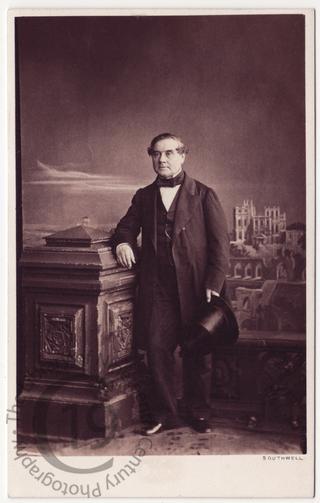
Jean-Sylvain Van de Weyer
A carte-de-visite portrait of the Belgian politician Jean-Sylvain Van de Weyer (1802-1874) who served as the Belgian Minister to the Court of St James’s, effectively the Belgian ambassador to the United Kingdom.
Van de Weyer was born in Louvain (Leuven) in 1802 but his family relocated to Amsterdam in 1811. The family later returned to Leuven when his father, Josse-Alexandre (1769–1838), was named police commissioner for the city. Jean-Sylvain studied law at the State University of Louvain and set up as a lawyer in Brussels in 1823. He frequently defended newspapers and journalists who had fallen foul of the government of the United Kingdom of the Netherlands, of which modern Belgium then formed the southern half.
On the outbreak of the Belgian Revolution in 1830, Van de Weyer was in Leuven but hurried to Brussels where he became a member of the central committee of the Provisional Government of Belgium. His command of the English language resulted in him serving as a diplomatic representative of the revolutionaries and King Leopold I appointed Van de Weyer his ‘special representative’ in London. Van de Weyer served as the eighth Prime Minister of Belgium (1845-1846) but subsequently returned to England as Belgian minister.
In 1839 he married Elizabeth Anne Sturgis Bates, only daughter of Joshua Bates of Barings Bank, and formerly of Boston. They had two sons and five daughters, who were brought up in Marylebone and on their parent’s country estate at New Lodge in Berkshire.
When he lay dying at his home in Mayfair in 1874, Queen Victoria came to see him one last time, later writing in her journal: 'Went up to London to 21 Arlington Street with Beatrice, Jane Caledon, and the 2 Equerries. Mme Van de Weyer met me below & took me up to the Drawingroom which opens into the one which is made into his bedroom. She bore up wonderfully & said she would tell him I was there. I felt agitated at the thought of seeing this dear valued friend so ill. He was in bed but raised himself up when he saw me, & was much moved, saying with difficulty "la visite de Votre Majesté glorifiera ma mort" & kissed my hand. I said he must not speak of that, & pressed him to lie back, as he seemed so breathless. I only stayed for 2 or 3 minutes. I then took his hand which he pressed & kissed, giving me a look which I cannot forget. I was quite upset coming out & then sat for some time talking to her. She seemed to think there was no hope & that the danger was imminent' (Queen Victoria's journals, 29 April 1874).
Photographed by the Southwell Brothers of London.
Code: 125578




